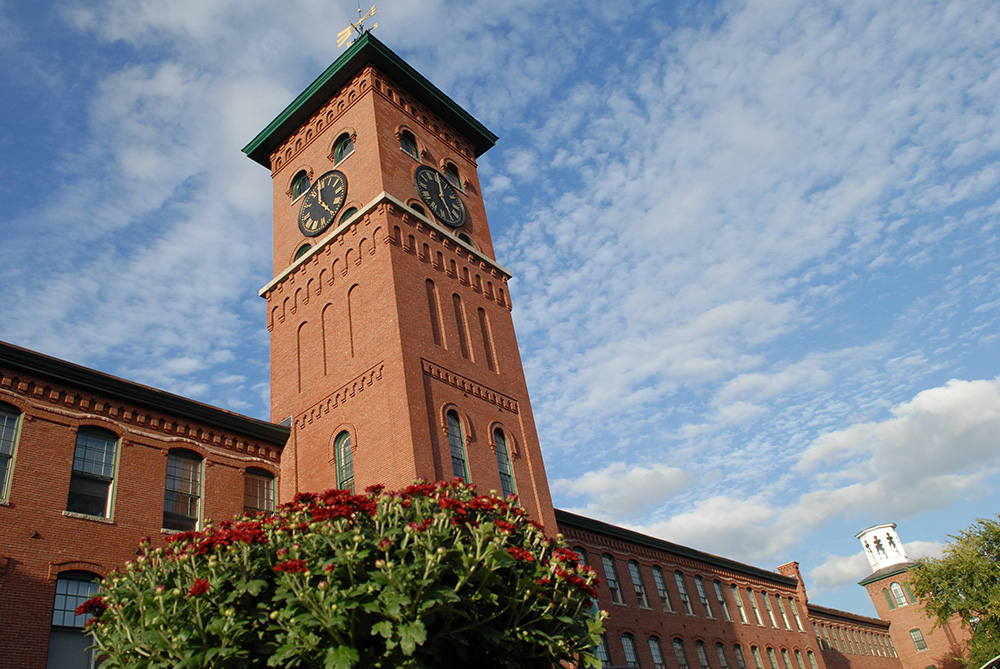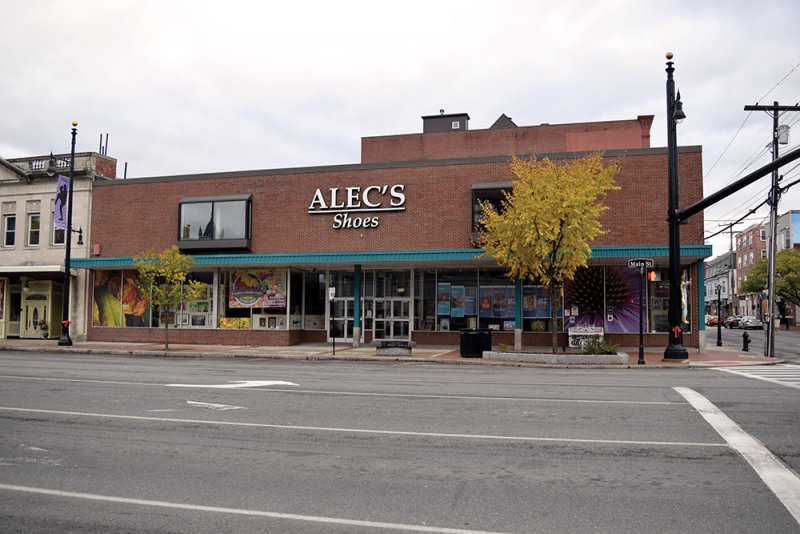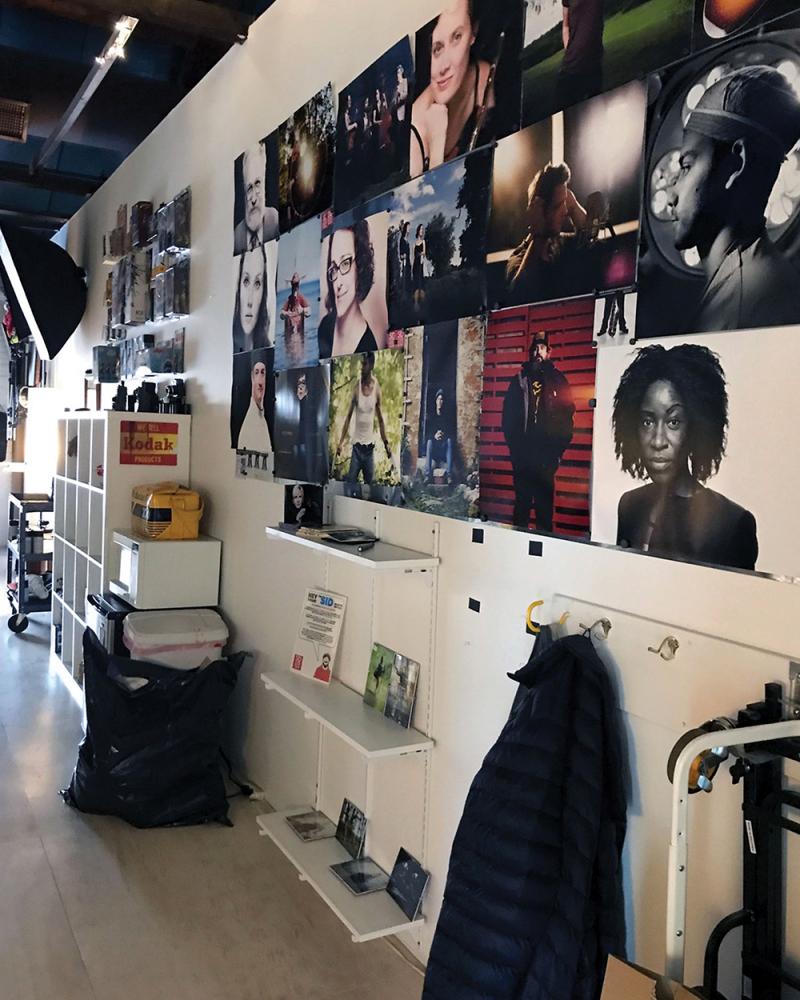
Clocktower Place, credited by many as having launched Nashua’s mills-to-housing movement. Courtesy of Wingate Companies.
Big-city assets and a small-town feel combine to make NH’s “Gate City” of Nashua an economic powerhouse, though one still facing workforce and housing challenges.
The community of 88,000 residents rests on the northern border of Massachusetts, at the confluence of the Merrimack and Nashua rivers, and that location—along with a storied history of mill enterprise and reinvention—still animates its commerce.
Nashua, the second largest city in the state, boasts an assortment of industries, from retail to manufacturing to high tech, all concentrated in 10 business districts. Southern NH’s largest employer, BAE Systems, maintains its electronics systems headquarters near the state line, while several national and international corporations—including software giant Oracle—have bases in the city.
The retail sector is concentrated in three areas: downtown, the Amherst Street commercial corridor, and South Nashua, where the newly renovated Pheasant Lane Mall is the cornerstone for the progression of regional and national chain stores lining Daniel Webster Highway.
Bisected by the F.E. Everett Turnpike, the city also hosts two hospitals, three colleges, an airport, and the Federal Aviation Administration’s Boston Air Traffic Control Center.
“It does have a great deal of diversity, and that has historically been one of Nashua’s strengths,” says Jay Minkarah, executive director of the Nashua Regional Planning Commission. “There isn’t an overall reliance on one sector.”
That’s due to prudent planning, according to Tracy Hall, president and CEO of the Greater Nashua Chamber of Commerce.
Reinvigorating a Mill City
Like so many New England communities, Nashua was built on the now-departed textile industry, with the former Nashua Manufacturing Company’s mills once producing 8,000 yards of cotton daily. The city was also home to several other mills seeking to compete—all powered by water.
World wars, the Great Depression, and the availability of cheaper forms of energy elsewhere led to a flight by mill owners, and Nashua’s last textile mill closed in the late 1940s. While the city still had some machine shops, iron foundries and small manufacturers, the mills had been the major employer.
“When the mills closed here, there was a need to reimagine what Nashua was,” says Hall. “City leaders at that time made a point of diversifying what we had to offer, and we’ve carried that through to today. We’re well balanced.”
That reimagining involved new forms of industry, and in the early 1950s, defense firm Sanders Associates, now part of BAE Systems, settled into one of the closed mills to launch the city’s rebirth. Two decades later, the arrival of Digital Equipment Corporation, now part of Hewlett-Packard, ensured Nashua’s standing as part of the Boston-area high-tech corridor.
Strengthening the Arts Scene
To keep that diversification going, the city is now pursuing plans for a downtown performing arts center and multiple mixed-use projects, some of which are expected to help with the shortage of affordable rental units in town. Many of the projects involve repurposing existing buildings—essential in a community with little land left for development.
The proposed performing arts center would be located in the former Alec’s shoe store, a 30,000-square-foot building on Main Street purchased by the city for $2 million this year. Envisioned is a 500- to 700-seat entertainment venue, possibly with a restaurant and some retail, according to Marylou Blaisdell, chair of the Downtown Improvement Committee and owner of DesignWares, a clothing and gift shop on Main Street.

The former Alec’s Shoes is the site for a proposed performing arts center. Photo by Christine Carignan.
The cost of the construction is $15.5 million, according to preliminary plans, and a $4 million endowment is part of the operating budget. Blaisdell says fundraising is “progressing well.”
Major Projects Proposed
Another proposal now before city officials calls for conversion of a building on Amherst Street, most recently a branch campus for Southern NH University, into a five-story apartment complex. The plan, put forth by Harbor Property Group, would provide 48 apartments, a restaurant and three retail spaces.
“It would open up opportunities to expand and relocate in that area,” says Hall.
On the drawing board, too, is a possible expansion of the Residences at Riverfront Landing project off Bridge Street, at the junction of the Nashua and Merrimack rivers. The development offers 152 apartments in two buildings and was done in two phases by contractor SMC, which bought the property from Renaissance Downtowns about two years ago. A third phase, which may include a restaurant and some retail, is under study.
Brady Sullivan Properties has also been rehabbing an old Nashua Corporation building on Franklin Street into 200 luxury loft-style apartments called Lofts 34, and Clocktower Place Apartments in Nashua’s downtown mill district has plans to expand. Many credit Clocktower Place with launching Nashua’s mills-to-housing movement, which got its start in the 1980s when six mill buildings were converted into 326 apartments.

The interior of a loft at Lofts 34. Courtesy of Brady Sullivan Properties.
The John Flatley Company continues to develop properties in South Nashua. Its 400-acre Gateway Hills offers a “live, work, play, shop” environment that is home to more than 75 companies, a 564-unit apartment complex, a convenience retail center, 105-room hotel and an outdoor amphitheater. Nashua Technology Park, formerly a Digital Equipment campus, and Nashua Office Park, are located on the property.
This developer has been helping to seed NH’s thriving tech scene with startups by hosting the Annual Flatley Challenge for the past seven years, a tech startup comp-etition that provides winners with free rent for one year at Nashua Technology Park or Nashua Office Park at Gateway Hills, and up to $10,000 to cover fit-up, connectivity and related costs.
Recent Developments
These newest proposals come on top of recent developments such as the 2015 completion of the Broad Street Parkway, which connects Exit 6 of the Everett Turnpike with the downtown to provide better access to the millyard, and the conversion of an 1870s textile mill into Millyard Technology Park on Technology Way.
In 2012, The Stabile Companies launched a $25 million Cotton Mill Square project that recast a 108-year-old Front Street mill into more than 100 affordable and market-rate apartments. In 2015, company president John Stabile was named the Greater Nashua Chamber’s Citizen of the Year for those efforts.
Stabile says the project was a multiyear effort that involved a $1.5 million expenditure to lower a nearby dam and remove the property from flood zone standing. Also, Stabile applied for multiple grants and tax credits through the NH Housing Finance Authority, Community Development Finance Authority, and U.S. Department of Housing and Urban Development. “It has been a huge success, virtually full since the day we opened it,” Stabile says, adding that he hopes to build 60 units of riverside elderly housing nearby within a year.
Thriving Downtown
Meanwhile, downtown has also undergone fresh improvements to its sidewalks and storefront facades, and has seen the establishment of Nashua Riverwalk, a 1.6-mile recreational path along the Nashua River.
Civic leaders say many of Nashua’s successes stem from its close-knit, cooperative community ethic. “We have big-city assets while still retaining a small-town New England feel,” explains Hall. “We’re not numbers, we’re people. The business community is directly engaged with the community. Our elected officials here are completely accessible to the community. That small-town, you-can-get-things-done feel is huge here.”
Nowhere is that small-town sensibility more apparent than on brick-lined Main Street, with its eclectic mix of shops, restaurants and boutiques. Multiple events, such as the annual holiday stroll from City Hall to Railroad Square, a seasonal farmers’ market, and an ArtWalk Weekend, draw residents and visitors alike throughout the year.

ArtWalk participant Racy Bennett, with her photo display at Just Lights. Photo by Allegra Boverman.
The city also offers numerous cultural opportunities, whether a performance by Peacock Players at the 14 Court Street Theater or an outdoor band appearance at the Greeley Park Bandshell.
Artists with the Nashua Sculpture Symposium have gifted the city with a variety of public sculptures that can be seen on a two-and-a-half-mile sculpture loop through the downtown, and the city is host to an annual International
Sculpture Symposium.
 Artist Tony Jimenez working on a sculpture titled “We Are,” which was gifted to the city by the Nashua Sculpture Symposium. Courtesy photo.
Artist Tony Jimenez working on a sculpture titled “We Are,” which was gifted to the city by the Nashua Sculpture Symposium. Courtesy photo.
MakeIt Labs on Crown Street a 12,000-square-foot makerspace for welding, machining, fabricating, carpentry and more, and the Picker Collaborative Artists Studio on Pine Street offers workshop and classroom space for artists in a variety of mediums.

Ceasar Photography located at the Picker Collaborative Artists Studio. Courtesy photo.
The city’s many parks and playgrounds offer opportunities for everything from baseball to boating, and SkyVenture and Surf’s Up in South Nashua invite guests to surf, skydive or rock-climb indoors.
Challenges
Even with all this success, like any city, Nashua faces challenges to its future prosperity. “One, and it’s universal across the state, is attracting talent, and to make sure we’re on top of enhancing the skills of our workforce,” says Hall, who cites a partnership between BAE Systems and Nashua Community College as an example of business and education working together to that end.
With online sales cutting into profit margins of brick-and-mortar establishments, the fate of retail is also a concern, Minkarah says. “The retail sector is in quite a flux nationally and that’s always a concern because it has an impact on employment,” Minkarah adds. “Even though retail tends to be at the lower end of the wage scale, they are very important jobs for those people, and it brings a lot of visitors to the city.”
Nevertheless, Nashua has escaped some of the impact felt by retailers in other communities, he notes. The recent closings of Sears stores in NH, for example, did not include the one in Nashua.
“That’s not to say it’s insulated for the future, but I do think the strategic location of Nashua is a strength when it comes to the retail sector,” he adds.
Minkarah also points to the high cost of housing, the second highest rents in the state (after Rockingham County) and a vacancy rate below 2 percent. “That’s a barrier to attracting people to the region,” he says. “Without the ability to attract new workers, our industries can’t grow. We need to have places for people to live, especially in the midlevel range.”
Tim Cummings, the city’s economic development director, agrees, saying, “The state is an aging state and we need more housing to attract a younger talent pool.” Minkarah says some of the recent plans for mixed-use developments that include housing will help address the issue, as will plans for similar developments in neighboring Merrimack.
“It probably goes without saying that the economies in the Nashua area are very closely linked,” he adds. “When you look at towns like Merrimack and Hudson, there’s a great deal of interdependency.”
Cummings says the lack of rail connectivity to Boston is another drawback for the city, but one that “we are actively working on addressing.”
Community leaders say Nashua has the resources to transcend its challenges. Cummings notes that the city continues to see growth in the high-tech and defense industries, and that the Broad Street Parkway creates opportunity in the millyard area for additional growth.
“We are home to some of the most talented people,” he adds. “Whether it is a scientist, an engineer, an architect or a financial professional, we have a workforce that will allow a business to thrive.”
The city is “kind of in the center of everything,” says Hall. “From Nashua, you’re 50 minutes from the shore or from Boston and an hour and 15 minutes from the Lakes Region, but we have a lot to offer within Nashua itself. We are so blessed as a city with a river that runs through it and that beautiful waterfront we can and should take advantage of.”

 Current Issue - April 2024
Current Issue - April 2024